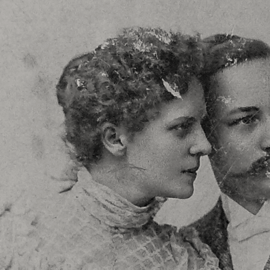Wiktoria Rosicka

Antonia Wiktoria Rosicka was born in Łódź into the family of the city’s mayor, Andrzej Rosicki. The publication in 1892 of Romeo and Juliet (Romeo i Julia) was the most serious literary challenge undertaken by the translator, who was not yet thirty. In 1897 she married Louis Gentil-Tippenhauer, a German railway engineer, and moved to Haiti before returning to Poland in the 1910s. In later life she published an abridged version of a Charles Dickens novel and two collections of stories for children, set in exotic locations.
Rosicka’s Romeo and Juliet inaugurated a series of world literature classics published in Łódź in an inexpensive edition aimed at a broad readership. The series was an expression of the mounting literary ambitions of the industrial city, famous for its textiles. The surname of the translator was undoubtedly significant. She was part of a well-known and respected family committed to the development of the city. Rosicka brought the syntax and the diction up to date, but adhered to the traditional literary style. She wrote in unrhymed 11-syllable lines, simplifying or shortening the text at difficult points.
In terms of chronology, Rosicka’s translation bears some traits of retranslation, appearing as an alternative to the pre-existing, canonical Polish version. Taking into account the ambition of the series opened by the play, the text serves above all as an attempt to make Shakespeare more accessible, without making a radical departure from earlier translation norms.
Rosicka’s translation was not republished, nor has it received much critical attention. The play has not been staged.

Bibliography of translations
William Shakespeare, Romeo i Julia. Tragedya w 5 aktach, tłum. Wiktorya Rosicka, Księgarnia L. Fischera, Łódź 1892 [„Biblioteczka Powszechna” I].
